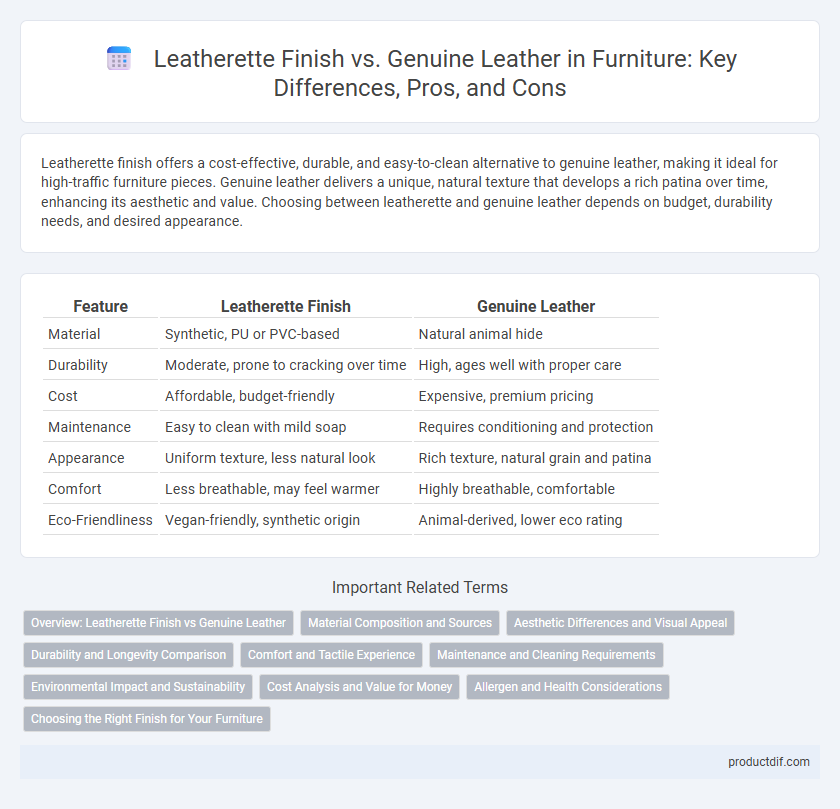Leatherette finish offers a cost-effective, durable, and easy-to-clean alternative to genuine leather, making it ideal for high-traffic furniture pieces. Genuine leather delivers a unique, natural texture that develops a rich patina over time, enhancing its aesthetic and value. Choosing between leatherette and genuine leather depends on budget, durability needs, and desired appearance.
Table of Comparison
| Feature | Leatherette Finish | Genuine Leather |
|---|---|---|
| Material | Synthetic, PU or PVC-based | Natural animal hide |
| Durability | Moderate, prone to cracking over time | High, ages well with proper care |
| Cost | Affordable, budget-friendly | Expensive, premium pricing |
| Maintenance | Easy to clean with mild soap | Requires conditioning and protection |
| Appearance | Uniform texture, less natural look | Rich texture, natural grain and patina |
| Comfort | Less breathable, may feel warmer | Highly breathable, comfortable |
| Eco-Friendliness | Vegan-friendly, synthetic origin | Animal-derived, lower eco rating |
Overview: Leatherette Finish vs Genuine Leather
Leatherette finish offers a synthetic, durable, and cost-effective alternative to genuine leather, providing water resistance and easy maintenance ideal for high-traffic furniture pieces. Genuine leather, derived from animal hides, delivers a natural texture, breathability, and long-lasting quality that often improves in appearance with age. Understanding the differences in texture, affordability, and durability helps consumers make informed choices based on their lifestyle and aesthetic preferences.
Material Composition and Sources
Leatherette finish is crafted from synthetic materials such as polyvinyl chloride (PVC) or polyurethane (PU), offering a man-made alternative that mimics the appearance of real leather. Genuine leather originates from animal hides, primarily cowhide, processed through tanning methods to enhance durability and texture. The distinct material composition affects factors like breathability, maintenance, and environmental impact, with genuine leather sourced from natural hides and leatherette produced through chemical manufacturing.
Aesthetic Differences and Visual Appeal
Leatherette finish offers a consistent, smooth texture with a uniform color that enhances modern furniture designs through sleek and polished appearances. Genuine leather showcases natural grain patterns and unique imperfections, adding depth and character that evoke luxury and authenticity. The choice affects visual appeal by balancing a flawless, contemporary look against a rich, organic aesthetic valued in high-end furniture pieces.
Durability and Longevity Comparison
Leatherette finish offers superior resistance to scratches, stains, and fading, making it highly durable for everyday use in furniture. Genuine leather ages gracefully, developing a unique patina over time while maintaining strong tensile strength, contributing to its long-lasting quality when properly cared for. Despite leatherette's lower maintenance, genuine leather typically outperforms in longevity and durability under consistent, attentive use.
Comfort and Tactile Experience
Leatherette finish offers a smooth, consistent texture with a cooler feel, ideal for those seeking low-maintenance comfort and easy cleaning. Genuine leather provides a plush, breathable surface that molds to the body over time, enhancing tactile warmth and luxurious softness. Both materials deliver unique sensory experiences, with leatherette favoring durability while genuine leather excels in natural comfort.
Maintenance and Cleaning Requirements
Leatherette finish requires minimal maintenance, needing only regular wiping with a damp cloth and mild soap for stains, making it resistant to cracking and fading. Genuine leather demands more intensive care, including periodic conditioning with leather creams to prevent drying and cracking, as well as avoiding prolonged exposure to sunlight. Both materials benefit from prompt cleaning, but genuine leather's porous nature makes it more susceptible to absorbing spills and requires specialized cleaning products.
Environmental Impact and Sustainability
Leatherette finishes have a lower environmental impact compared to genuine leather, as they require less water, chemicals, and land resources in production. Genuine leather, derived from animal hides, involves significant greenhouse gas emissions and contributes to deforestation and water pollution through tanning processes. Opting for high-quality leatherette made from recyclable materials supports sustainability efforts by reducing reliance on animal agriculture and lowering carbon footprints in furniture manufacturing.
Cost Analysis and Value for Money
Leatherette finish offers a more budget-friendly alternative to genuine leather, often costing 30-50% less while providing similar aesthetic appeal and durability for everyday use. Genuine leather commands a higher price due to its natural material, superior breathability, and long-term aging benefits that enhance value over time. For cost-conscious buyers, leatherette maximizes initial savings, but genuine leather delivers better value for money through longevity and enhanced comfort.
Allergen and Health Considerations
Leatherette finish furniture is hypoallergenic and resists dust mites and pet dander, making it suitable for individuals with allergies or respiratory issues. Genuine leather, while durable, can sometimes accumulate allergens if not regularly cleaned and may cause irritation for those sensitive to animal products or tanning chemicals. Choosing leatherette can reduce exposure to allergens and improve indoor air quality in homes with allergy-prone occupants.
Choosing the Right Finish for Your Furniture
Leatherette finish offers a cost-effective, durable alternative to genuine leather, ideal for families and high-traffic areas due to its resistance to stains and easy maintenance. Genuine leather delivers unmatched natural texture, breathability, and longevity, making it a premium choice for luxury and long-term investment in furniture. Assessing factors such as budget, usage frequency, and desired aesthetic helps determine the right finish that balances practicality with style in your interior design.
Leatherette Finish vs Genuine Leather Infographic

 productdif.com
productdif.com